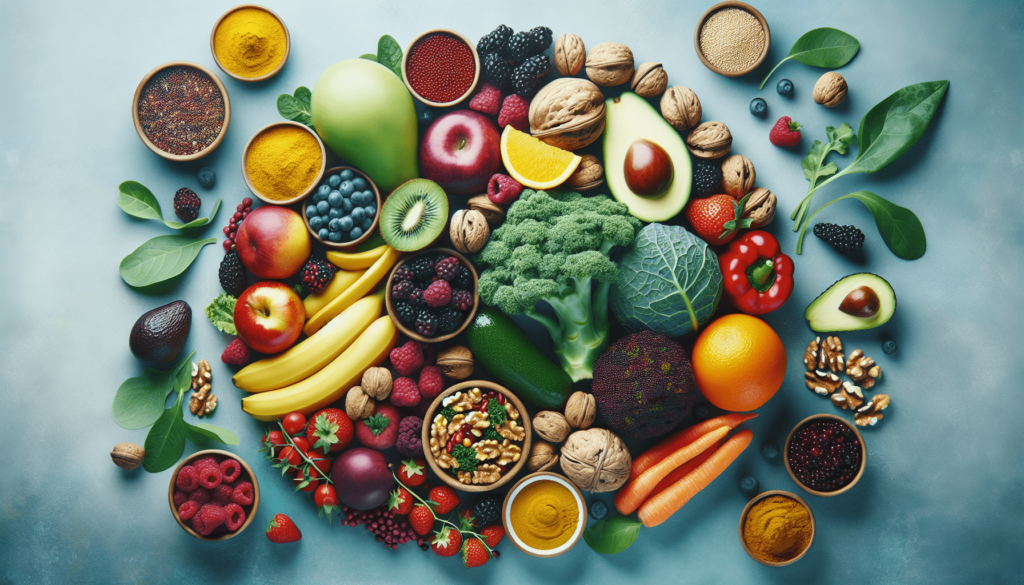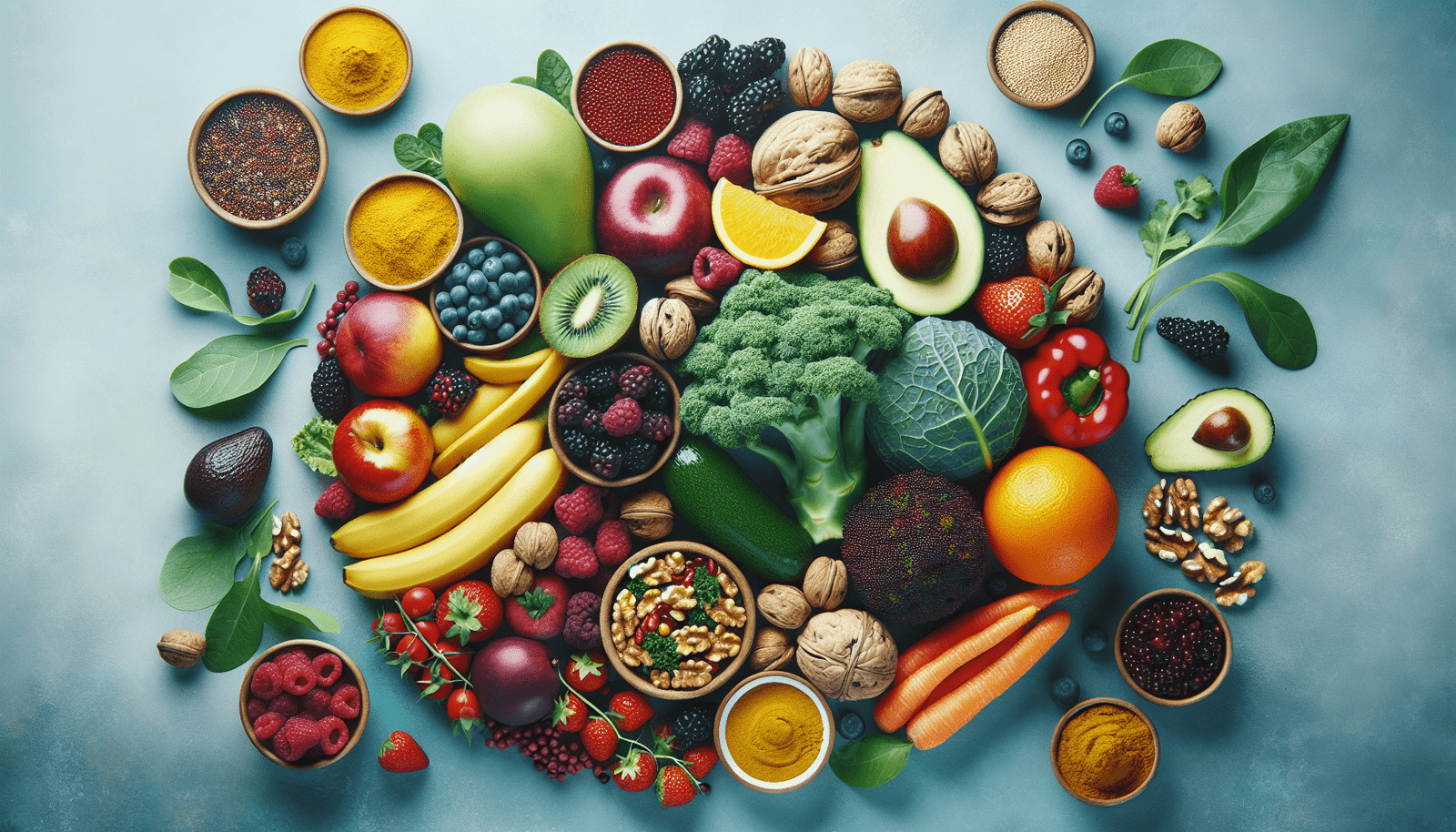Have you ever wondered whether the hype surrounding superfoods is justified or just a marketing strategy? In this article, we will delve into the debate surrounding superfoods and analyze their nutritional claims. Discover the truth behind these nutrient-packed foods and whether they truly live up to their reputation. Get ready to separate the facts from the fads and make informed decisions about your food choices.

What are superfoods?
Definition
Superfoods are a group of nutrient-dense foods that are believed to offer exceptional health benefits due to their high concentrations of vitamins, minerals, and antioxidants. These foods are often considered to go above and beyond the average nutritional content found in typical whole foods, providing a concentrated source of essential nutrients.
Characteristics
Superfoods are typically recognized for their exceptional nutritional profile, which often includes high levels of antioxidants, vitamins, and minerals. They are often low in calories, fat, and sugar while simultaneously offering substantial amounts of fiber and essential nutrients. Superfoods are also known for their potential to promote overall health and well-being, with claims ranging from boosting the immune system to reducing the risk of chronic diseases.
Common superfoods
Blueberries
Blueberries are one of the most well-known superfoods, cherished for their sweet and tangy taste, as well as their numerous health benefits. Packed with antioxidants, blueberries help combat oxidative stress and inflammation in the body. They are also rich in vitamin C, fiber, and manganese, offering a nutritious addition to any diet.
Kale
Kale, often referred to as a nutrient powerhouse, is a leafy green vegetable that has gained immense popularity in recent years. Bursting with vitamins A, C, and K, kale is a great source of antioxidants and can aid in reducing inflammation and promoting healthy digestion. It also contains iron, calcium, and fiber, making it a fantastic addition to salads, smoothies, or sautés.
Quinoa
Quinoa, a protein-rich grain, has become a staple in many health-conscious households. This superfood is gluten-free and contains all nine essential amino acids, making it a complete protein source for vegetarians and vegans alike. Quinoa is also loaded with fiber, iron, magnesium, and manganese, contributing to its reputation as a nutrient-packed powerhouse.
Salmon
Salmon, a fatty fish abundant in omega-3 fatty acids, is often hailed as a superfood for its potential to improve heart health. These healthy fats have been linked to a reduced risk of cardiovascular diseases and can also support brain health. Additionally, salmon provides an excellent source of protein, vitamin D, and B vitamins, making it a highly nutritious choice for those seeking a balanced diet.
Chia seeds
Chia seeds have gained popularity due to their impressive nutritional profile. These tiny black seeds are packed with fiber, protein, omega-3 fatty acids, and antioxidants. They can help promote healthy digestion, regulate blood sugar levels, and contribute to satiety. Chia seeds can be easily incorporated into various recipes, such as smoothies, puddings, or baked goods.
Nutritional claims
Antioxidant-rich
One of the key nutritional claims associated with superfoods is their high antioxidant content. Antioxidants are compounds that help protect the body from oxidative stress, which can contribute to chronic diseases and aging. Superfoods, such as blueberries and chia seeds, are believed to possess high levels of antioxidants, offering potential benefits in combating free radicals and promoting overall health.
High in vitamins and minerals
Superfoods often boast an impressive array of essential vitamins and minerals, making them a valuable addition to a well-rounded diet. Foods like kale and salmon are rich in vitamins A, C, and K, while quinoa provides minerals like iron, magnesium, and manganese. By including superfoods in your diet, you can ensure you’re getting a diverse range of vital nutrients necessary for optimal health.
Anti-inflammatory properties
Many superfoods have been linked to potential anti-inflammatory properties, which can be beneficial in reducing the risk of chronic diseases such as heart disease and certain types of cancer. Blueberries, for example, contain anthocyanins, which have been shown to possess anti-inflammatory effects. Regular consumption of these superfoods may help support a healthy inflammatory response in the body.
Weight loss aid
Some superfoods, such as chia seeds, have gained popularity as potential aids in weight loss. Due to their high fiber content and ability to absorb water, chia seeds can contribute to satiety and may help curb excessive food intake. However, it is important to remember that weight loss is a complex process, and incorporating superfoods alone is not a guaranteed solution.
Improved heart health
Certain superfoods, particularly those rich in omega-3 fatty acids like salmon, have been linked to improved heart health. Omega-3 fatty acids have been shown to lower triglyceride levels, decrease blood pressure, and reduce the risk of heart disease. Including superfoods like salmon in your diet, along with other heart-healthy choices, can play a role in maintaining cardiovascular wellness.
Scientific evidence
Study on superfoods
Numerous scientific studies have explored the potential benefits of superfoods and their impact on human health. For example, a study published in the Journal of Nutrition found that regular blueberry consumption may lead to improved insulin sensitivity and reduced inflammation in obese individuals. Another study published in the American Journal of Clinical Nutrition suggested that quinoa consumption could contribute to a lower risk of type 2 diabetes.
Criticism from experts
While superfoods have gained significant popularity, some experts argue that the term itself is more of a marketing buzzword than a scientific classification. They emphasize the importance of a balanced diet that includes a variety of whole foods, rather than relying solely on specific superfoods. Additionally, critics highlight the lack of regulation surrounding the labeling and promotion of these foods, which can lead to misleading claims or inflated expectations.

Marketing and media influence
The role of the food industry
The food industry has played a significant role in the promotion and popularity of superfoods. Companies often capitalize on the perceived health benefits of these foods and market them as must-have items for optimal health. As a result, the food industry has seen a surge in the production and availability of superfood-based products, ranging from energy bars to supplement powders.
Media coverage and advertising
Media coverage and advertising have also played a vital role in shaping consumer perception of superfoods. Through articles, television segments, and social media influencers, superfoods have been portrayed as miracle foods capable of transforming health and well-being. However, it is crucial to critically evaluate the information presented and consider the broader context of a well-balanced diet.
Consumer perception
The influence of marketing and media coverage on consumer perception of superfoods cannot be ignored. Many consumers associate the term “superfood” with exceptional health benefits and view them as a quick fix or a cure-all for various health concerns. While superfoods can certainly contribute to a healthy diet, it’s important to remember that they should be only one component of an overall nutritious eating plan.
Balanced diet versus superfoods
Importance of overall nutrition
It’s important to recognize that superfoods should not overshadow the significance of an overall balanced diet. While their nutrient density is commendable, no single food can provide all the necessary nutrients for optimal health. A well-rounded diet, rich in a variety of fruits, vegetables, whole grains, lean proteins, and healthy fats, is essential for meeting nutritional needs and promoting overall well-being.
Variety and moderation
Superfoods are best consumed as part of a varied and balanced diet. Incorporating different types of superfoods ensures that you are benefiting from a wider range of nutrients. However, it’s important to consume superfoods in moderation and alongside other nutritious foods to maintain a well-rounded nutritional intake and avoid excessive reliance on any one particular food.
No magic food
While superfoods are indeed packed with essential nutrients, it’s essential to remember that they are not magical solutions to health problems. No single food can replace a healthy lifestyle, which includes regular physical activity, sufficient sleep, stress management, and overall mindful eating habits. Superfoods can be a beneficial part of a healthy diet, but they should not be considered a standalone solution.
Potential risks and limitations
Allergies and intolerances
Superfoods, like any other food, can pose risks to individuals with allergies or intolerances. For example, individuals with a known allergy to seafood should be cautious when consuming superfoods like salmon. It is crucial to be aware of any allergies or sensitivities and choose superfoods accordingly. Consulting with a healthcare professional or registered dietitian can help determine suitable alternatives if needed.
Expense and accessibility
Another limitation of superfoods is their potential expense and accessibility. Some superfoods, like exotic berries or specialty grains, can be costly and may not be accessible to everyone due to geographical location or economic constraints. However, it’s important to note that there are plenty of affordable and locally available superfoods that can still provide significant health benefits.
Lack of regulation
The labeling and promotion of superfoods can sometimes lack regulation, which can lead to misleading claims or exaggerated marketing tactics. The absence of standardized criteria for identifying superfoods can make it challenging for consumers to make informed choices. Therefore, it is crucial to approach information about superfoods critically and rely on reputable sources when making decisions about incorporating them into your diet.
The importance of individual needs
Dietary requirements
One size does not fit all when it comes to nutrition. Individual dietary requirements vary based on factors such as age, gender, activity level, and underlying health conditions. While superfoods can offer valuable nutrients, it is essential to consider your unique nutritional needs and tailor your diet accordingly. Consulting with a registered dietitian or healthcare professional can help create a personalized nutrition plan that considers these factors.
Health conditions
Certain health conditions or medications may necessitate specific dietary modifications. While superfoods can provide numerous health benefits, they may not always be suitable for individuals with certain medical conditions or those taking specific medications. Consulting with a healthcare professional can help determine which superfoods, if any, are appropriate for your specific health needs and potential interactions with medications.
Consulting professionals
To navigate the world of superfoods, it is wise to seek guidance from professionals who can provide evidence-based advice. Registered dietitians, nutritionists, or healthcare professionals can offer personalized recommendations based on your unique needs and goals. They can help you understand how superfoods fit into a well-balanced diet and ensure you’re making informed choices for your overall health and well-being.
Conclusion
Understanding superfoods’ place
Superfoods undoubtedly offer exceptional nutritional benefits, but it’s important to place them in the context of an overall balanced diet. They can contribute to a well-rounded and diverse nutrient intake, providing valuable vitamins, minerals, and antioxidants. However, no single food can replace a comprehensive approach to nutrition that includes a variety of whole foods.
Making informed choices
While the marketing and media hype surrounding superfoods can be persuasive, it’s essential to make informed choices based on scientific evidence and personal circumstances. Remember that no single food holds the key to perfect health. Instead, focus on a varied, balanced diet that provides all the necessary nutrients for your individual needs. Incorporating superfoods into your diet can be a flavorful and nutritious addition, but they should not be relied upon as a magic solution for well-being. Be mindful, listen to your body, and consult with professionals to create a nutrition plan that supports your overall health and long-term wellness.

